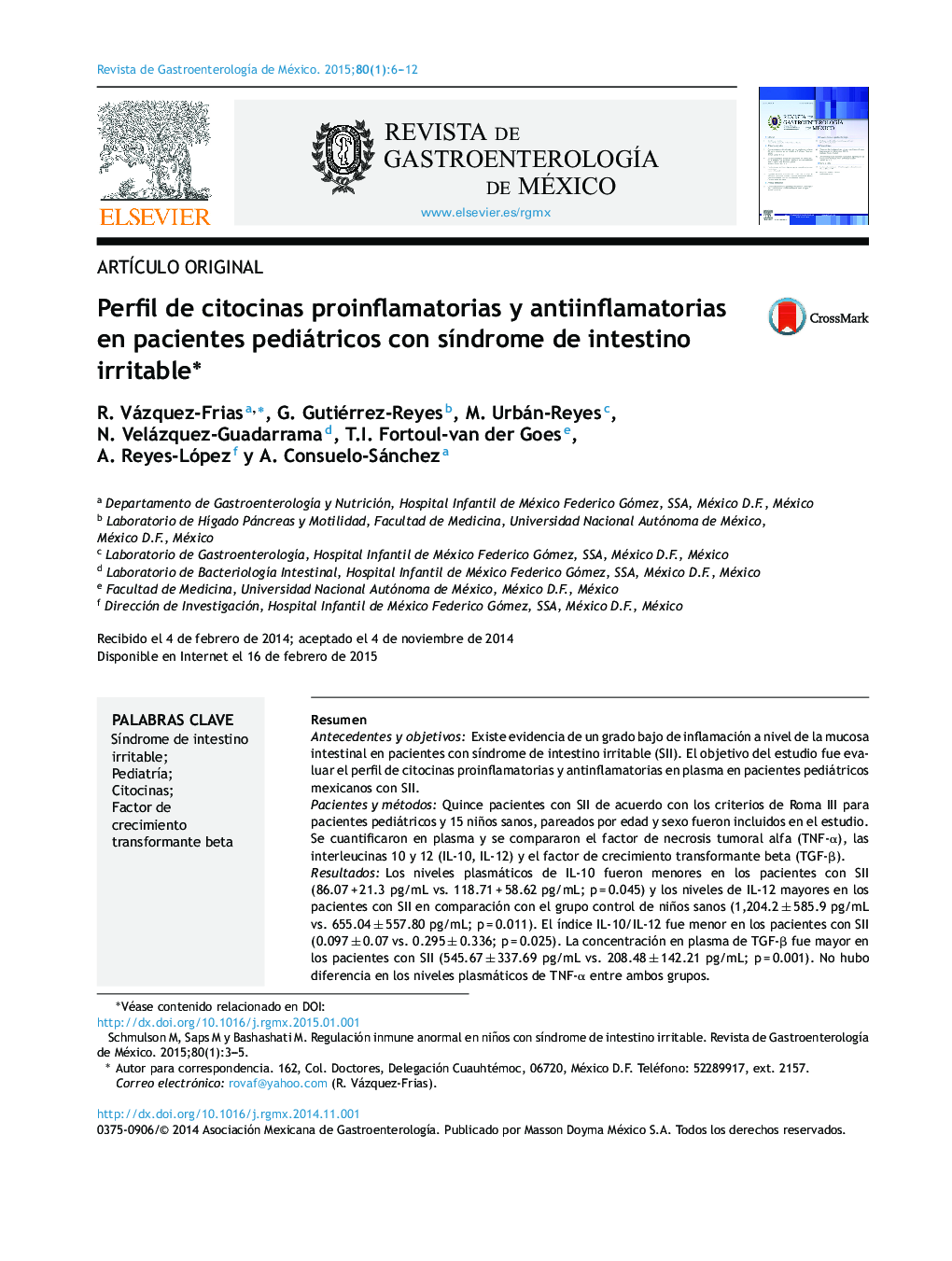| کد مقاله | کد نشریه | سال انتشار | مقاله انگلیسی | نسخه تمام متن |
|---|---|---|---|---|
| 3318736 | 1211641 | 2015 | 7 صفحه PDF | دانلود رایگان |
ResumenAntecedentes y objetivosExiste evidencia de un grado bajo de inflamación a nivel de la mucosa intestinal en pacientes con síndrome de intestino irritable (SII). El objetivo del estudio fue evaluar el perfil de citocinas proinflamatorias y antinflamatorias en plasma en pacientes pediátricos mexicanos con SII.Pacientes y métodosQuince pacientes con SII de acuerdo con los criterios de Roma III para pacientes pediátricos y 15 niños sanos, pareados por edad y sexo fueron incluidos en el estudio. Se cuantificaron en plasma y se compararon el factor de necrosis tumoral alfa (TNF-α), las interleucinas 10 y 12 (IL-10, IL-12) y el factor de crecimiento transformante beta (TGF-β).ResultadosLos niveles plasmáticos de IL-10 fueron menores en los pacientes con SII (86.07 + 21.3 pg/mL vs. 118.71 + 58.62 pg/mL; p = 0.045) y los niveles de IL-12 mayores en los pacientes con SII en comparación con el grupo control de niños sanos (1,204.2 ± 585.9 pg/mL vs. 655.04 ± 557.80 pg/mL; p = 0.011). El índice IL-10/IL-12 fue menor en los pacientes con SII (0.097 ± 0.07 vs. 0.295 ± 0.336; p = 0.025). La concentración en plasma de TGF-β fue mayor en los pacientes con SII (545.67 ± 337.69 pg/mL vs. 208.48 ± 142.21 pg/mL; p = 0.001). No hubo diferencia en los niveles plasmáticos de TNF-α entre ambos grupos.ConclusionesEste estudio indica que los niños con SII presentan un estado de alteración de la regulación inmune. Aún está pendiente por dilucidar el papel que juegan estas citocinas, específicamente la TGF-β, en la patogénesis del SII.
Background and objectivesThere is evidence that patients with irritable bowel syndrome (IBS) have a low degree of inflammation in the intestinal mucosa. The aim of the study was to evaluate theprofile of pro- and anti-inflammatory cytokinesin plasmain Mexican pediatric patients with IBS.Patients and methodsFifteen patients with IBS according to Rome III criteria for childhood and 15 healthy children, matched by age and sex, were included in the study. Plasma levels of tumoral necrosis factor alpha (TNF-α), interleukins 10 and 12 (IL-10, IL-12) and transforming growth factor beta (TGF-β) were quantified and compared between groups.ResultsPlasma levels of IL-10 were lower in patients with IBS (86.07 + 21.3 pg/mL vs. 118.71 + 58.62 pg/mL: P=.045) and IL-12 levels were higher in patients with IBS compared to the control group of healthy children (1,204.2 ± 585.9 pg/mL vs. 655.04 ± 557.80 pg/mL; P=.011). The IL-10/IL-12 index was lower in patients with IBS (0.097 ± 0.07 vs. 0.295 ± 0.336; P=.025). Plasma concentration of TGF-β was higher in patients with IBS (545.67 ± 337.69 pg/mL vs. 208.48 ± 142.21 pg/mL; P=.001). There was no difference in plasma levels of TNF-α between groups.ConclusionsThis study suggests that children with IBS have a state of altered immune regulation. This is consistent with the theory of low-grade inflammatory state in these patients. Further studies are needed to elucidate the role played by these cytokines, specifically TGF-β in the pathogenesis of IBS.
Journal: Revista de Gastroenterología de México - Volume 80, Issue 1, January–March 2015, Pages 6–12
